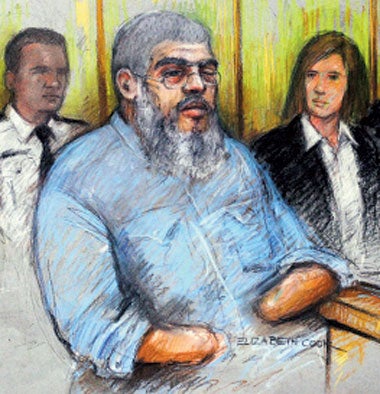Hamza 'preached of duty to kill non-believers'

The Muslim preacher Abu Hamza exhorted his followers to murder non-believers as part of their duty to Islam in inflammatory lectures recorded for distribution around Britain, the Old Bailey was told.
The cleric, 47, who faces 15 charges ranging from soliciting murder to reproducing material designed to stir up racial hatred, was also said to have also possessed an 11-volume "manual for terrorism" which detailed how to make explosives and conduct assassinations.
The prosecution told the opening day of Mr Hamza's trial that under the guise of a respected communal leader, or sheikh, the defendant "preached murder and hatred" over a period of years at locations including the Finsbury Park Mosque in north London. The court heard that when police arrested Mr Hamza in May 2004, some 15 months after the Finsbury Park Mosque was closed, they discovered nearly 3,000 copies of video and audio recordings of public and private lectures given by the cleric.
In these sermons, it was claimed that the preacher provided a lifestyle "blueprint" which made it clear that the murder of non-Muslims was as much part of the Islamic faith as a halal diet and eschewing alcohol.
David Perry, for the prosecution, told the jury: "As a person delivering a sermon in a holy place and as a spiritual leader you might expect that [Mr Hamza's] talks would contain expressions of hope, charity and compassion. In fact, the speeches contained very little on these matters. The prosecution case, in a sentence, is that Sheikh Abu Hamza was preaching murder and hatred.
"He told his congregations it was part of their religious duty to fight in the cause of Allah and it was part of their religious duty to kill. The people who it was being encouraged to kill were non-believers - those who did not believe or were not 'true followers' of Islam."
Mr Hamza denies all 15 charges against him, including eight counts of soliciting murder, four of using threatening language to stir up racial hatred and one of possessing an article likely to be of use to anyone preparing acts of terrorism - namely an 11-volume Encyclopedia of Afghani Jihad detailing theories and practice of guerrilla warfare.
The encyclopedia, in Arabic, was found on a bookshelf in the preacher's home. It was alleged the books contained detailed descriptions of how to make bombs and explosives, "dog fight" combat and the use of handguns. It also described "hitting" famous targets and symbols of the West, including Big Ben and "large congregations of people at Christmas".
The Egyptian-born cleric, who appeared in court dressed in a pale blue traditional Arab garment but was not wearing his "hook" false arms, listened carefully as Mr Perry described how police found 2,700 audiotapes and more than 570 videotapes when they raided his home in Shepherd's Bush, west London.
They included multiple copies of some of the cleric's lectures and a number of "master" tapes which it was claimed might have been used for reproducing the sermons for sale across Britain by Supporters of Sharia, a fundamentalist Islamic campaigning group co-founded by Hamza.
The lectures, given in public at the Finsbury Park Mosque and at private events hosted by Supporters of Sharia between 1996 and 2002, covered a wide range of topics, including licensing laws, adultery, the "evils of democracy" and a theory that E-number food additives made products haram, forbidden for Muslims. It is claimed the cleric used the sermons to justify suicide bombings, advocate the assassination of "apostate" Arab leaders and suggest that Hitler had been sent to punish the Jews.
The jury of seven women and five men was told that the subject of jihad, considered by Mr Hamza to mean a holy war, was at the core of the sermons but introduced only as part of a wider discussion of how a Muslim can survive in Britain - a country described by the cleric as like "living in a toilet". Mr Perry said it did not matter the prosecution would not name anyone who had attended the lectures and could not show that anyone had followed Mr Hamza's directions.
He said: "The breadth of what [Hamza] had to discuss demonstrates the control he seeks to exercise over his listeners. The talks are a blueprint for living. When he talks about jihad and the obligation to pursue war against unbelievers he presents himself as a moral and civic leader. The fact the prosecution cannot point to any individual act of murder is irrelevant, because the offence of soliciting murder is made out if the defendant, by his words sought to encourage or even embolden or persuade his audience to commit murder."
The trial, which is expected to last up to four weeks, continues.
